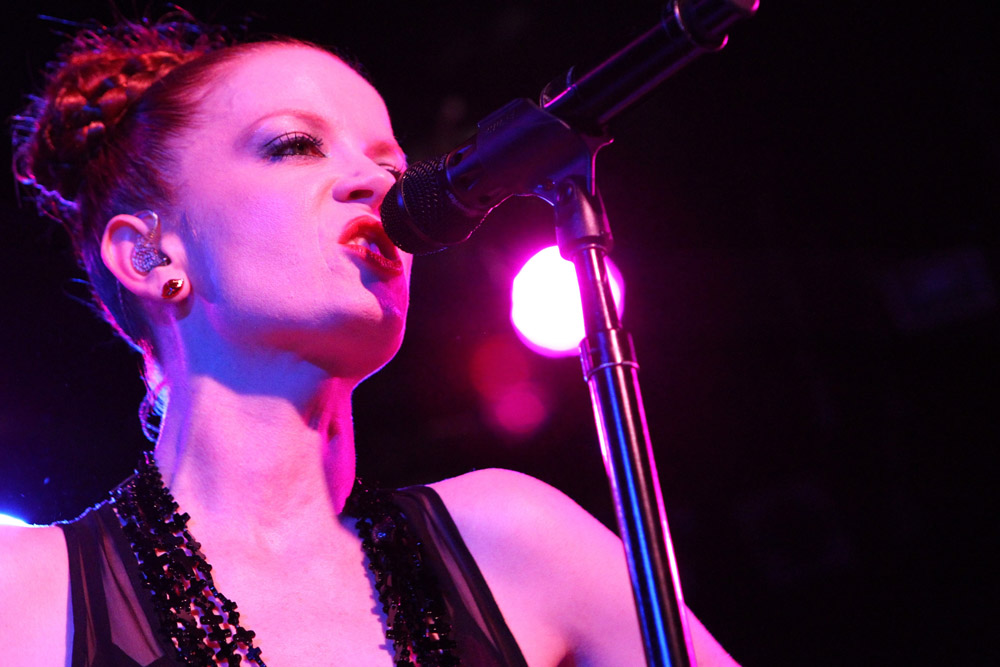Garbage was always synonymous with a certain kind of sexy. Is that something you came to embrace over the years?
No, I find it laughable. I was 28 when Garbage broke, so I was old enough to understand the danger in tying your worth to sex appeal. It’s a trap for women because it’s something they can’t hold on to. To me, who you are is the most important thing. What you do says more about your value in the world than how you look. I really believe that, and those are the strengths you can rely on when things get tough, because they inevitably do. That line of thinking stops women from believing in themselves as artists, from being curious and brave. Instead, we wind up with girls that sound ten a penny, who are coming off tour and having their songs handed to them. We’re not hearing authentic experiences from women.
Considering the ’90s, with Garbage, No Doubt, Alanis Morissette, and Courtney Love, did you think things would be different by now?
Yeah, I really felt like my generation burst through the glass ceiling. There were so many alternative female voices being heard in the mainstream, and now it feels like everything is floating back down to how things were prior to the ’60s even, when women dressed pretty and spoke nice and were always putting on like Betty in Mad Men. I want to see some wild, unorthodox thinking; I’m aching for it. I love pop music, and I respect people like Katy Perry and Lady Gaga. They work their asses off and they’ll have the last laugh. But I don’t see any balance out there.
But are we also too critical of women in music? Lana Del Rey, for instance?
It’s unbelievable what’s happened to Lana Del Rey! It’s shocking misogyny. I look at her and say, “What more do you want?” Here’s a beautiful young girl who tried her hand at being a working musician under her own name and it didn’t stick. She had the fortitude to go back to the drawing board and create something new, a perfectly executed re-entry into the world of music, and she’s getting destroyed for the very same thing that Jack White is so brilliant at. Granted, they’re very different artists, but why are we attacking a young girl who’s ballsy and creative? All I can say is they did the same thing to me when I came out. I was constantly being called a phony, and I’m thinking, “I was in a band that failed miserably for ten years. What’s fake about that?” You don’t get in a fucking transit van and tour around Europe if you’re a fucking phony. Let me assure you, it ain’t easy.
You fought the perception that you were just the face of Garbage, even though you wrote songs. What did that feel like, and how did you overcome it?
It was awful. I was finally allowed to be creative, to write and have input into something that people valued, and then I was treated like a piece of flotsam. I wasn’t undervalued; I was dismissed. To say it didn’t sting would be a lie. But I guess there’s a real pugilistic streak in me because I was just like, “Fuck it. I’ll show you,” and I kept at it.
Do you think putting out a solo album would have dispelled that once and for all?
I wanted to put out a solo record because I was stuck on a major label and sick of it. We needed to be Top 5 in the charts and sell at least a million records or Garbage was a failure. [After 2005’s Bleed Like Me] I was like, “This is a mad, nutty game I want no part of.” I wanted to take my ball, go home, and make a very dark, very quiet record that wouldn’t be judged on those terms. I didn’t think for a minute they wouldn’t actually let me release it — that was my own naïveté. I’ve told this story and still don’t know if anyone actually believes me, but they said to me, “We see you as the Annie Lennox of your generation.” Now I respect her enormously, but I want to make a record that sounds like me. Their response: “Until you deliver us a pop record, we’re not interested.” It was so extreme that I’m grateful for that kind of rub, because it made me determined to get out of my contract. I realized that I was incorruptible, which is great because sometimes you forget. When a band becomes that successful, you don’t know how much you value that until it’s gone. But I said, “I can live without you. I can live without fame. I can live without success or money and I will be okay. I can make my life exciting for me. Go buy some hooker on 42nd Street because this isn’t for sale.”
So why didn’t you take those songs and put them out on your own?
I have attention deficit disorder. I get bored really quickly. There’s a song I wrote with Grant Lee Buffalo that I’m holding on to. I gave a song to Sky Ferreira, and the nucleus of the new Garbage song “Blood for Poppies” was from those sessions, but I’d kinda moved through that. I want to be really loud now. I’m back to wanting the guitars to roar.
There’s a song on the new album called “I Hate Love,” but that can’t be true.
My dad has taken massive offense to the title of this song. I get a lecture about it almost weekly. Of course, it’s not going up against the concept of true love, but so much is made of love in our society that isn’t real love. Some of my friends who are married treat one another like shit. It’s more to do with the commercialized idea of love and what pain that puts us through. That, and knowing that there will be no more torture in your life than really, truly loving somebody who doesn’t love you back.
Your bandmates have said they hear optimism in your latest lyrics. Do you agree?
Therein lies the dichotomy of me and my band. No, I am a positive person. I’m grateful to be alive. I’m enthusiastic and passionate, but I do see death marching toward me. I see the end of the world. That feeling is omnipresent for me. That was the great part about making this record. When my mom died, I just wanted to quit. If she wasn’t there to hear it, then what was the point? But a good friend of mine said, “That’s the worst thing you could do. Your mom would be the most bummed out by that.” So I recalibrated my relationship with music. I’d never taken myself seriously as an artist. Not as a singer, not as a writer — nothing. I stopped being so hard on myself, and said, “This is what you love, what you’ve done your entire life. Why would you stop now?” I decided to do only what thrilled me, nothing else mattered, and suddenly I was coming from a fearless place. The world wasn’t going to end. The clouds weren’t going to fall. Finally, things were okay.
This story originally appeared in the April edition of SPIN’s iPad app, SPIN Play.





